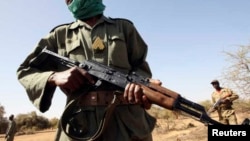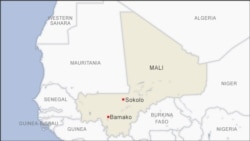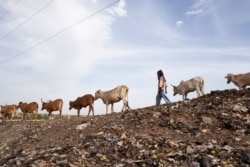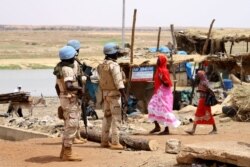The ongoing crisis in northern and central Mali and neighboring countries could spill over into the southern part of the West African country if conflicts over land and other natural resources are not addressed, warns an international peace-building group.
International Alert (AI), a London-based organization that works on peace building in conflict zones, said in a report released Monday that resolving land issues must be a priority for peace-building efforts in the region.
The report examines land conflicts in southern Mali and the way they are addressed by traditional authorities and the state.
Exploited by extremist, criminal groups
While the southern region of Mali has largely been stable, challenges such as climate change, population movement and the presence of extremist groups in north and central Mali raise concerns about new waves of violence in the region, the report said.
Deep-rooted conflicts over resources could be exploited by extremist or criminal groups to exacerbate the violence taking place in northern and central Mali, said Camille Marquette, the author of the report.
"What I'm looking at in this report is the level of mistrust among local communities towards the government," Marquette told VOA.
"When the state cannot provide security and governance to people, they turn to their own communities to organize themselves or try to reach out to an outside supplier of security and governance. This basically offers an operation base for radical groups," he said.
Grievances over access to land and other natural resources, including clashes between farmers and herdsmen, have been at the heart of the violence in Mali. Combined with other social, economic and political factors, such tensions have been exploited over time by armed groups, the IA's report said.
The insurgency in Mali began in 2012 when a separatist uprising in the northern part of the country was largely taken over by al-Qaida affiliates. Since then, thousands of civilians and military personnel have died in the conflict.
Violence in central Mali also has increased since 2015, when Islamist armed groups moved from northern into central Mali.
Last week, the New York-based Human Rights Watch said it has documented more than 800 civilian deaths in central Mali in attacks carried out by various ethnic militias and Islamist armed groups.
Different groups, different objectives
The Jama'at Nasr al-Islam wal Muslimin (JNIM), an alliance between several jihadist groups, is the main group that is active in parts of Mali. The group has pledged allegiance to al-Qaida.
The Islamic State in the Greater Sahara, an IS affiliate, is also active in Mali and other countries in the Sahel region.
But experts say instability is not only attributed to violent extremism. Ethnic tensions are also a source of major intercommunal violence between various militias in Mali.
"What we're looking at are different armed groups and those armed groups all have different sets of interests, different objectives, different tactics and different modes of operating," said Daniel Eizenga, a Research Fellow at the Africa Center for Strategic Studies in Washington.
"Given the diversity of groups and their dynamic characteristics, it is plausible that the conflict could spread to southern Mali and other areas in the larger region," he told VOA.
Eizenga added that neighboring countries such as Burkina Faso and Niger have already felt the effects of violence in Mali.
International troops
The U.N. mission in Mali has about 14,000 peacekeeping troops in Mali. In addition, France has about 4,500 troops stationed in Mali, while Paris plans to increase its military presence with 600 additional troops.
The United Kingdom also has announced that 250 British troops will be deployed to Mali later this year to help fight extremism in the region.
But experts believe that relying only on military options in Mali has proven ineffective.
"Delivering on security in Mali means going beyond military presence. It also means investing in addressing the root causes of conflict that allow violent extremism to flourish in the first place," analyst Marquette said, adding that, "Acting on land issues and other grievances today will help avoid the high cost of remedial action in the future."
In an effort to bring an end to the conflict, the government of Malian President Ibrahim Boubacar Keita has been seeking to begin a dialogue process, which involves potential peace talks with the main jihadist groups in Mali.







